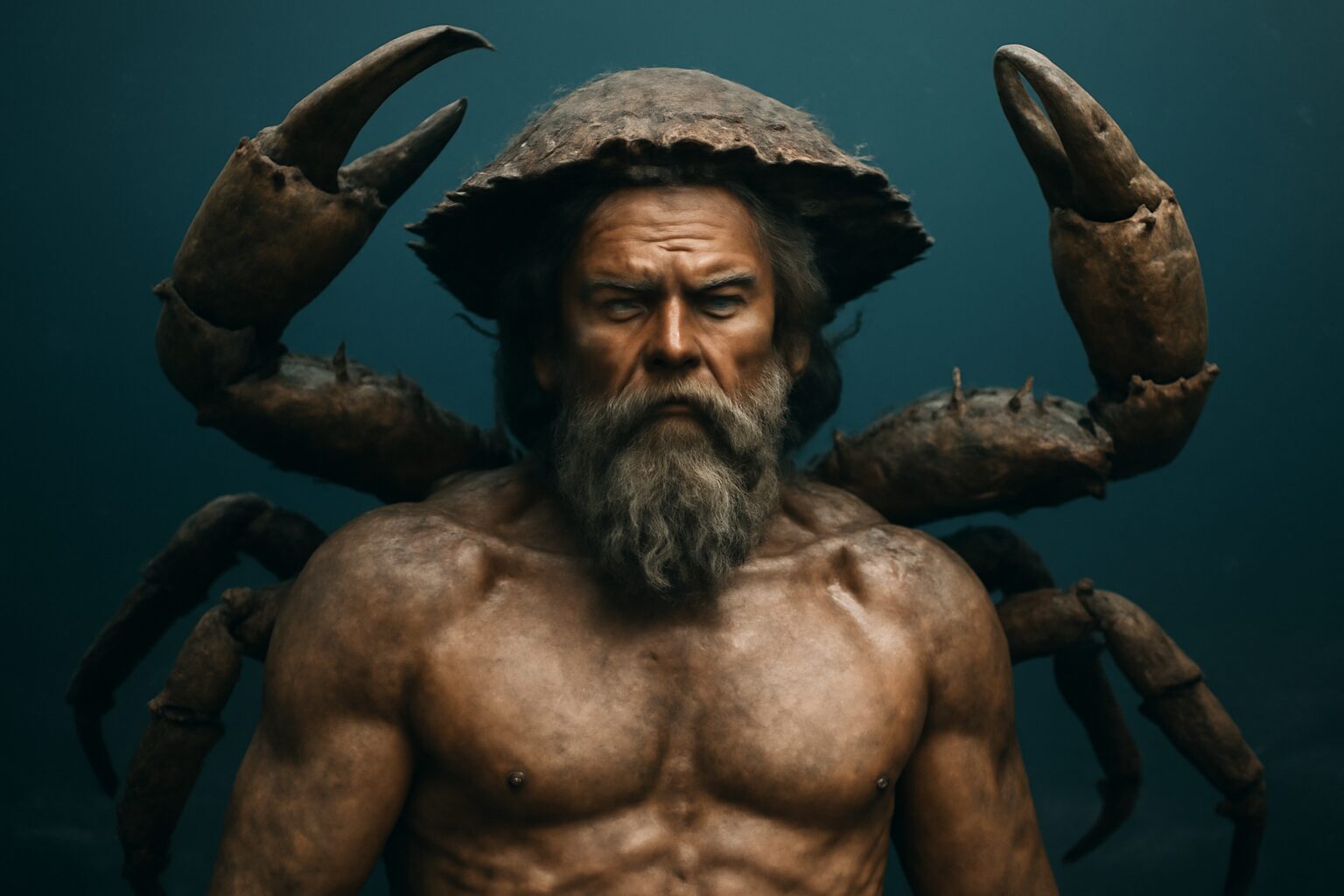Carcinus: The Giant Crab of Greek Mythology
In Greek mythology, Carcinus (also known as Karkinos) was a giant crab sent by the goddess Hera to aid the Lernaean Hydra in its battle against Heracles (Hercules). Though not as famous as other mythological creatures, Carcinus played a notable role in one of the hero's most challenging labors.
Role in the Labors of Heracles
During Heracles' second labor—the slaying of the Hydra—Hera, who despised the hero, sent Carcinus to distract and attack him. The crab emerged from the swamp, snapping at Heracles' feet with its massive claws. Though Carcinus was formidable, Heracles swiftly crushed it underfoot or, in some versions, smashed it with his club. Despite its brief appearance, Carcinus' interference highlighted Hera's relentless opposition to Heracles.
Symbolism and Legacy
After its death, Hera honored Carcinus by placing it among the stars as the constellation Cancer. This act immortalized the crab's loyalty and service to the gods. In astrology, Cancer is associated with tenacity and protectiveness, traits reflected in Carcinus' mythological role.
Though Carcinus is often overshadowed by the Hydra in the tale, its presence underscores the theme of divine intervention in Heracles' trials. The crab's brief but fierce attack exemplifies the many obstacles the gods placed in the hero's path.
Relationships and Significance
Carcinus' story is tied closely to Hera, who used the creature as a pawn in her vendetta against Heracles. Unlike other monsters, Carcinus was not inherently evil but acted under divine command. Its fate—crushed yet immortalized—reflects the complex relationship between mortals, heroes, and the gods in Greek mythology.
Though minor in comparison to other creatures, Carcinus remains a fascinating example of how even the smallest players in myth could leave a lasting mark, both in the stars and in the tales of heroes.
Alternative Names for Carcinus
God Name: Cancer (Roman)
In Roman mythology, Carcinus is often referred to as Cancer, which is the Latin word for 'crab'. This name is derived from the constellation Cancer, which is associated with the crab in the myth of Hercules and the Hydra.
God Name: Karkinos (Greek)
Karkinos is the original Greek name for Carcinus, meaning 'crab'. This name is directly tied to the creature's role in Greek mythology, particularly in the story where it was sent by Hera to distract Hercules during his battle with the Hydra.
God Name: The Crab of Hera (Greek)
This alternative name highlights the crab's association with the goddess Hera, who sent it to aid the Hydra against Hercules. It emphasizes the creature's divine patronage rather than its species.
Tales about Carcinus
The Crab's Alliance with Heracles
During the legendary Twelve Labors of Heracles, the hero faced the many-headed Hydra in the swamps of Lerna. As Heracles fought valiantly, the goddess Hera, who despised the hero, sent the giant crab Carcinus to distract and attack him. Carcinus, loyal to Hera, emerged from the murky waters and clamped onto Heracles' foot with its mighty pincers. Though the crab fought fiercely, Heracles crushed it under his heel. In recognition of its service, Hera placed Carcinus among the stars as the constellation Cancer, forever memorializing its brief but brave stand.
Carcinus and the Wrath of Poseidon
In the age when gods and monsters roamed freely, Carcinus dwelled in the depths of the Aegean Sea. One stormy night, the sea god Poseidon was enraged by the arrogance of a passing ship whose captain claimed to command the waves. To teach the mortals a lesson, Poseidon summoned Carcinus and commanded the colossal crab to rise from the abyss. With its massive claws, Carcinus gripped the vessel’s hull, shaking it violently until the sailors begged for mercy. Pleased, Poseidon calmed the seas but left the ship scarred as a warning, rewarding Carcinus with a place of honor among the sea’s most feared guardians.
Frequently Asked Questions
Who is Carcinus in Greek mythology?
Carcinus is a lesser-known sea deity in Greek mythology, often depicted as a giant crab. He is most famous for aiding the Hydra in its battle against Heracles (Hercules) during one of his twelve labors.
Why is Carcinus important in Greek myths?
Carcinus is important because his intervention in the battle between Heracles and the Hydra led to his transformation into the constellation Cancer by Hera, showcasing how even minor deities could play roles in major myths and celestial symbolism.
What lesson can we learn from the story of Carcinus?
The story of Carcinus teaches about loyalty and consequences. Despite his small role, his loyalty to the Hydra led to his demise, but also his immortalization in the stars, reflecting how actionsu2014even in support of evilu2014can have lasting impacts.
How does the myth of Carcinus apply today?
The myth of Carcinus can be seen as a metaphor for unintended consequences or the idea that even small acts can lead to significant outcomes. It also highlights how ancient cultures used myths to explain natural phenomena, like constellations.
Is Carcinus worshiped like other Greek sea gods?
No, Carcinus was not widely worshiped like major sea deities such as Poseidon or Oceanus. He appears primarily as a symbolic or minor character in myths, with no known cults or temples dedicated to him.













